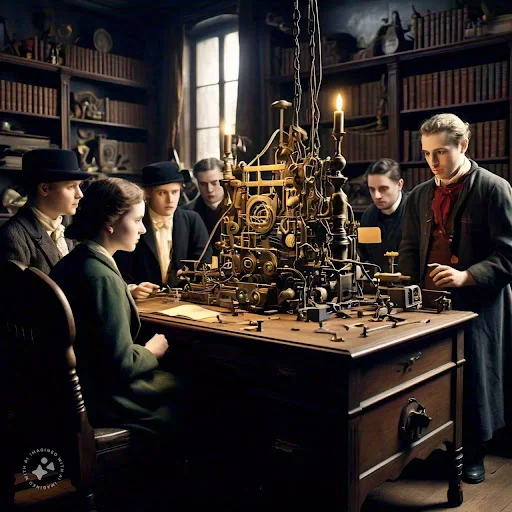- Get link
- X
- Other Apps
- Get link
- X
- Other Apps
Imagine a world where steam engines roared, horse-drawn carriages filled the streets, and the Industrial Revolution was at its peak. Now, add one of the most transformative inventions of modern times—the internet—into this picture. What would life have been like if the internet had been invented in the 19th century? How would this have changed history, communication, and society? Let’s dive into this fascinating alternate reality.
A Victorian Internet: A Glimpse Into an Alternate Reality
It’s the 1870s. Gas lamps light up cobbled streets, grand Victorian buildings stand tall, and factories churn out goods powered by steam. Suddenly, a new invention emerges—an interconnected network capable of transmitting information instantly across the globe. This revolutionary technology, let’s call it the "Victorian internet," connects cities, countries, and even continents through telegraph lines and rudimentary electrical systems.
Communication Transformed
In the 19th century, communication was painstakingly slow. Letters took weeks to travel across oceans, and even telegrams were limited in scope. But with the internet in the mix, everything changes:
- Real-Time News: Imagine hearing about major events like the signing of the Emancipation Proclamation or the fall of the Bastille within minutes instead of weeks. Newspapers, once the primary source of information, would have evolved into instant news websites, bringing the world closer together.
- Scientific Collaboration: Charles Darwin, while penning On the Origin of Species, could have exchanged ideas with scientists across the globe in real time. The pace of discovery in fields like medicine, physics, and engineering would have accelerated dramatically.
Industry and Trade Revolution
The Industrial Revolution was already a time of unprecedented growth, but an internet-driven society would have supercharged it.
- Global Markets: Merchants could list their goods online, creating a Victorian version of Amazon. Imagine ordering exotic tea blends or handmade textiles and having them delivered by steam-powered trains.
- Optimized Factories: With internet connectivity, factory owners could track production, manage supply chains, and even receive orders instantly from international clients.
A Peek at Victorian Social Media
Let’s not forget the cultural implications. Social media in the 19th century would have been an entirely unique phenomenon.
- Tweets via Telegraph: A tweet might have been sent through telegraph lines—short, direct messages reaching thousands. Victorian debates, literature snippets, and even love notes might have been shared instantly.
- Steam-Powered YouTube: Imagine platforms where performances of Shakespearean plays or Beethoven’s symphonies could be streamed to audiences worldwide using rudimentary projection systems.
- Influencers in Corsets: Instead of Instagram influencers, we’d have aristocrats and artists showcasing their lavish lifestyles, elaborate gowns, or stunning oil paintings.
The Challenges of a 19th-Century Internet
Of course, this technological leap wouldn’t come without hurdles:
- Limited Access: In a society divided by class, only the elite would initially have access to such a revolutionary invention, widening the gap between the rich and the poor.
- Primitive Technology: Without modern computers, the internet would rely on steam-powered servers and analog systems—efficient for the time but prone to frequent breakdowns.
- Ethical Concerns: Data security and misinformation would likely become pressing issues in a world still grappling with the concept of individual rights and privacy.
How History Would Have Changed
The internet in the 19th century could have altered the course of history:
- Faster Wars and Diplomacy: Nations could communicate faster, making wars escalate quickly but also enabling swifter peace negotiations.
- Global Cultural Exchange: Writers like Jane Austen could have shared their works with global audiences, sparking cross-cultural movements much earlier.
- Early Globalization: The exchange of goods, ideas, and innovations would have ushered in a truly globalized world centuries earlier.
Conclusion: A World Beyond Imagination
While the idea of the internet in the 19th century may sound like steampunk fantasy, it gives us a fascinating perspective on how transformative technology reshapes society. It also raises questions about the balance between progress and preparedness. Could our ancestors have handled the challenges of this powerful tool, or would it have created more chaos than connection?
As we ponder this alternate reality, one thing becomes clear: the internet’s impact is timeless, and its potential to unite or divide depends entirely on how it’s used.
So, what do you think? Would a Victorian internet have been a blessing or a burden? Let’s discuss!
- Get link
- X
- Other Apps

Comments
Post a Comment